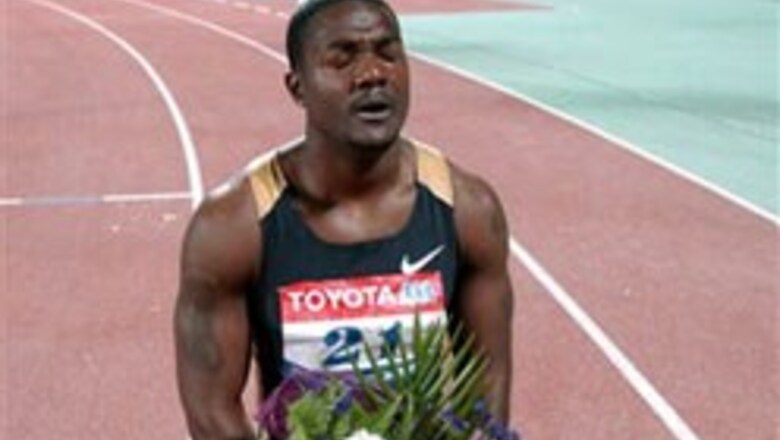
views
Colorado Springs (Colorado): The US Olympic Committee banned Justin Gatlin's track coach from its training facilities on Thursday, making him the first target in a newly amplified effort to quash doping in sports.
Trevor Graham, who trains the 100 metre co-world record holder accused of drug cheating, was barred indefinitely from all Olympic training centres and sites in the US, committee chairman Peter Ueberroth said.
Graham became the first coach to receive such a penalty, "based on the unusual number of athletes he has coached who have been convicted of doping offenses," Ueberroth said in a conference call.
At least six athletes under Graham have received drug suspensions, and Gatlin recently disclosed a positive test in April for testosterone or other steroids. He faces a lifetime ban for what would be a second drug violation.
The ban is mostly symbolic because Graham's athletes don't train at the USOC's three training centers and 12 training sites across the country. Still, it sets a new tone and could signal bigger things to come.
Graham, who answered the door on Thursday at his house in Raleigh, NC, refused to comment.
But he did speak with WRAL-TV, saying the ban was unfair.
"They're just trying to get rid of me," Graham said. "There are a number of people just out to get me. I'm not trusting no one right now, at this point."
Ueberroth also announced the USOC will be issuing next week a "call to action, in capital letters," asking for greater support and research on doping issues from the federal government and US sports entities.
"This is a national issue," Ueberroth said. "Nothing less than this will be needed, a collaborative effort. If we stand still, we run the risk of losing an entire generation of sports participants and sports fans."
Ueberroth and USOC CEO Jim Scherr acknowledged a shift in focus for the federation. In the wake of scandal and reorganization, the USOC spent recent years reallocating resources to improve the performance of US athletes.
Now, they say, the emphasis can't be solely on winning.
"If we don't participate with honour and dignity, then what we do means nothing," Scherr said. "If there's cheating, then it's cheating other athletes, the American public and cheating the world of the legitimacy of sports."
The cornerstone of the USOC's drug strategy was set in 2000, when the federation created the US Anti-Doping Agency. Since then, USADA has become widely recognised as one of the world's best doping agencies.
Although the association can't comment specifically on Graham, CEO Terry Madden applauded the USOC announcements and said USADA's efforts continue on many fronts, including those looking into criminal activity.
"USADA continues to cooperate with the federal government in its ongoing investigation into the BALCO doping scandal," Madden said.
PAGE_BREAK
In June 2003, Graham helped launch the federal investigation of the Bay Area Laboratory Co-Operative by anonymously mailing a syringe containing a previously undetectable steroid to USADA.
He acknowledged mailing the syringe at the 2004 Athens Olympics, and has noted the action as a way of defending himself against allegations that he's involved in doping.
"If they had any kind of case against me, I wouldn't be here right now," Graham told WRAL-TV. "I've never been in front of the grand jury. I've never testified in front of the grand jury. I'm not under any kind of investigation. So, what's going on?"
Gatlin is not the only elite athlete trying to clear his name; findings against the sprinter came days after a testosterone imbalance showed up in a urine sample of Tour de France champion Floyd Landis. The American cyclist also denies knowingly taking testosterone.
Graham said Gatlin was the victim of a vengeful massage therapist who rubbed testosterone cream on him without his knowledge. But the therapist, Christopher Whetstine, who has worked with Olympian Marion Jones and other elite athletes, says the coach's allegations are untrue.
Gatlin's attorney has distanced the runner from Graham's comments.
In 2004, the head of USA Track and Field, Craig Masback, met with Gatlin and suggested the sprinter find another coach, a person with knowledge of the meeting said.
Masback made the suggestion because of Graham's involvement in the BALCO case and Gatlin's status as a rising star in the sport, said the source, who asked not to be identified because of the sensitivity of the issue.
Though Graham has always denied direct knowledge or involvement with performance-enhancing drugs, he has been squarely in the aim of the USOC, which has been looking for ways to penalise coaches, agents and trainers who influence athletes with positive tests.
The USOC made no announcement on Thursday about barring Graham from future competitions, which wouldn't be as easy as restricting access to its own training centres.
Officials at track's international governing body, however, said earlier this week that they could ban Graham for two years with the right evidence.
"There is a process spelled out. There are due rights for people to participate," Scherr said. "We'll follow those processes."
Before Thursday's announcement, officials with the final Golden League meet in Berlin barred any athletes linked to Graham from the September 3 event.
Five-time Olympic medalist Marion Jones, Olympic 200-metre champion Shawn Crawford and sprinter Dwight Thomas are among the athletes excluded.















Comments
0 comment